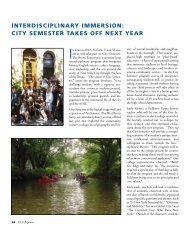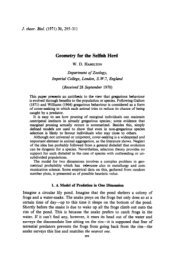Chapter 6 - Ethical Culture Fieldston School
Chapter 6 - Ethical Culture Fieldston School
Chapter 6 - Ethical Culture Fieldston School
Create successful ePaper yourself
Turn your PDF publications into a flip-book with our unique Google optimized e-Paper software.
“Mr. Sinatra Gets Rejected”<br />
had inhabited them with an intensity that few of us have the stomach for.<br />
Because let’s face it: dreams wear you down. Even if you have confidence, talent,<br />
opportunity, energy, courage, and luck – things I’ve spent the last few pages<br />
tracing – there’s no guarantee that you’ll get what you want, or that you’ll be<br />
satisfied once you do.<br />
Indeed, even after achieving more fame, wealth, and admiration than any<br />
sane person could ever hope to achieve, Sinatra – like many before and after him<br />
– seemed to regard mere success as somehow unworthy of serious consideration.<br />
“Happy? I don’t know,” Sinatra once responded to a query about the early days.<br />
“I wasn’t unhappy, let’s put it that way. I never had it so good. Sometimes I<br />
wonder whether anybody had it like I had it, before or since. It’s was the<br />
damnedest thing, wasn’t it? But I was too busy ever to know whether I was<br />
happy or even to ask myself.” 24<br />
More than anything else, it was Sinatra’s busy‐ness – his legendary work<br />
ethic that cut through the culture of personality he came of age in – that was<br />
cornerstone of his success. And that busy‐ness, in turn, rested on an assumption<br />
that his (often remarkably focused) actions would make a difference as to the<br />
outcome of his life. The American Dream has been many different things to<br />
many different people in the last four centuries, but its inexhaustible ends have<br />
tended to obscure its indispensable means: a sense of agency. Not everyone can<br />
become a star, but those who do usually believe that will is the engine of success.<br />
“Luck is fine, and you have to have luck to get the opportunity,” Sinatra once<br />
told columnist Earl Wilson. “But after that, you’ve got to have talent and know<br />
how to use it.” 25 There’s little doubt where the emphasis is here. But as Sinatra<br />
would learn, luck and opportunity (not to mention to actions of others) will<br />
24 Quoted in Taraborell, p. 56.<br />
American History for Cynical Beginners<br />
22
















